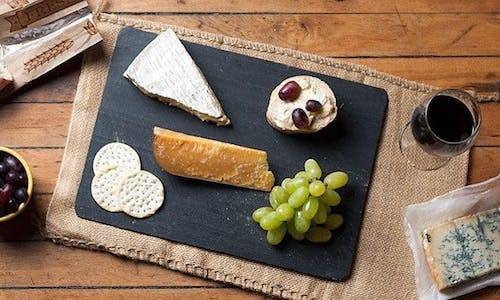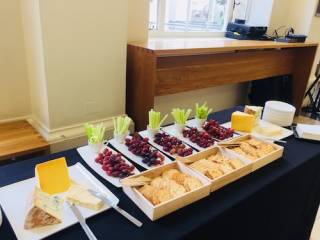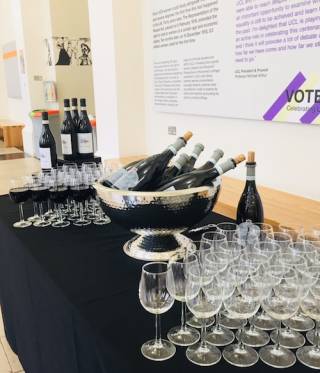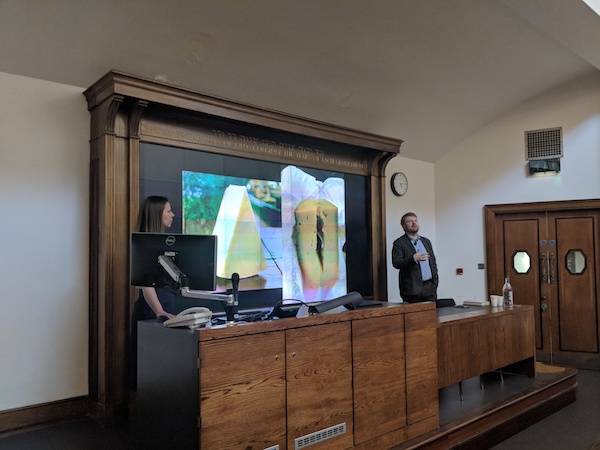Oliver Patel, 1 June 2018

This year's Food, Metabolism and Society research domain summer lecture, was, without doubt, the cheesiest one yet! Proceedings were kicked off by Bronwen Percival and Francis Percival, the unofficial power couple of the cheese world. Their one hour talk was based on their new book, Reinventing the Wheel: Milk, Microbes and the Fight for Real Cheese.
Bronwen Percival is the cheese buyer for Neal's Yard Dairy in London, and Francis Percival writes on food and wine for various publications, such as The World of Fine Wine. Together, they offered fascinating insights on all things cheese, from the history and politics of the industry, to the nitty gritty science of agriculture, dairy farming and microbiology. Their combined knowledge spans multiple disciplines and perspectives, and their passion for the subject made for a captivating talk.
Focusing on the role of microbes in generating cheese flavour, and the importance of microbiological research to dairy farming more broadly, the pair lamented the current state of affairs in the industry. All too often, they argued, major dairy producers opt for cheesemaking processes which are cheaper and simpler. For example, they might kill all the bacteria present, despite the fact that such an approach is unnecessary. This often results in cheese which is more basic and simple on a microbiological level, which invariably means more boring and bland tasting cheese.
They argued that microbiological diversity is the secret for exciting cheeses with rich and interesting flavours, and big prizes are out there for farmers willing to put in the effort and investment in their production processes. However, they stressed that microbiological diversity should not mean 'as many different microbes as possible', but that a balanced and diverse makeup of the right kinds of microbes is the way to go. Aside from microbiological diversity, they also stressed the importance of the cows having a rich and varied diet, as well as a squeaky clean udder, to get the best milk possible.
Interestingly, they claimed that of all foods, cheese is the one in which the interventions and decisions of the farmers can be tasted the most -- making their advice all the more important!

After this talk and the subsequent Q&A, the audience was invited to a cheese and wine tasting reception, featuring specially ordered cheese from Neal's Yard. The delicious British cheeses on offer included a sweet and delightful Stilton, a classic Cheddar and a soft, creamy Goat's cheese. (The wine, selected by sommelier Francis Percival, wasn't too bad either!) There was even a real cheesemaking stand, where UCL artist Dr Ellie Doney helped participants make their own cheese.
During the reception, UCL experts and Food, Metabolism and Society domain members Dr Joanne Santini, Dr Michael Sulu, Professor Mark Thomas (FMS domain co-chair) and Dr Rachel Warmington each gave 15 minute Science Soapbox talks. Proving that there really is no such thing as a free lunch (or cheese and wine, in this case), it was ensured that there would be no free cheese without some more science!

These talks marked a fantastic end to the evening, and all were fascinating in their own right. Joanne Santini focused on microbes and metabolism, and even passed round microbiological props for the audience to play with. Michael Sulu's talk was on all things fermentation, from food to pharmaceuticals. Rachel Warmington asked how chives can help bananas, and Mark Thomas, who was part of the team responsible of the analysis of the recent 'Cheddar man' genome sequence, explained why Cheddar man would say 'yes' to cheese but 'no' to milk, if only he had the option.

Oliver Patel is a Research Associate at UCL.
 Close
Close

